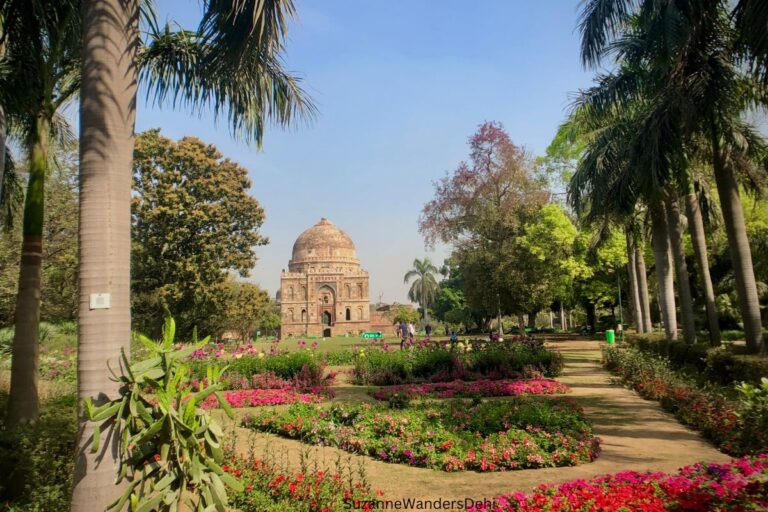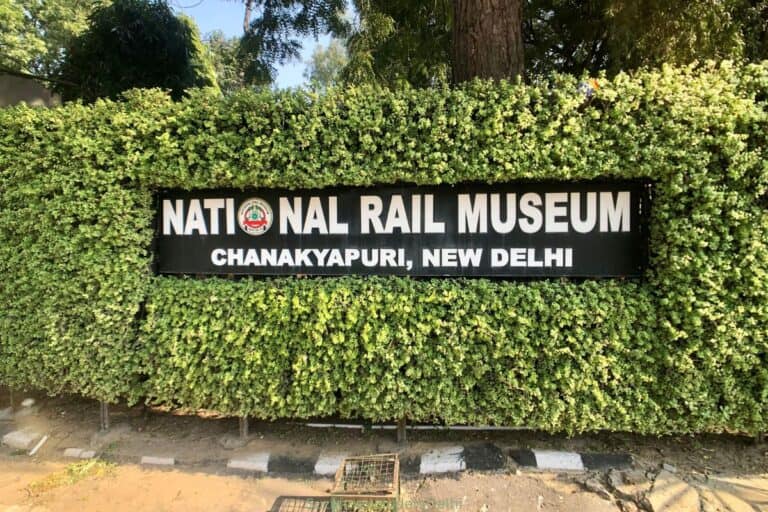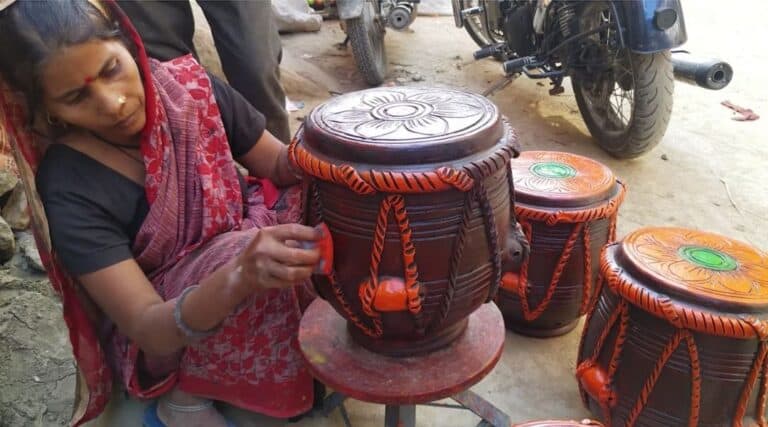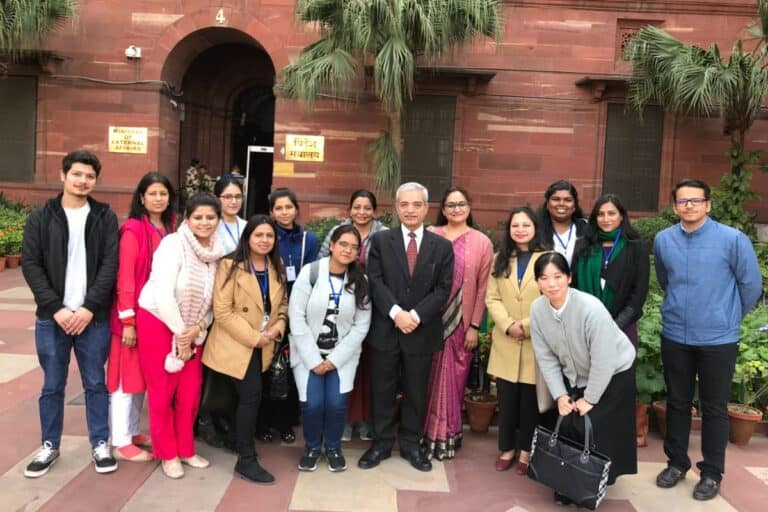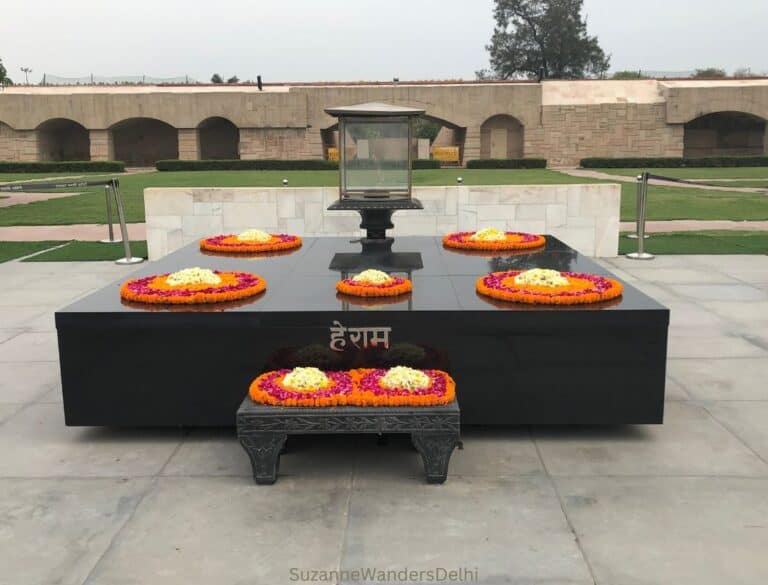Diwali in Delhi: How to Celebrate the Festival of Lights

If you are lucky enough to be in Delhi during the famous festival of lights, here is everything you need to know about celebrating Diwali in Delhi. Diwali falls during peak tourist season, and even though it is a family holiday, there’s many ways you can enjoy Diwali as a tourist or visitor. My first time in Delhi was during Diwali, and since then I have celebrated many Diwalis in Delhi!
👉 This year Diwali is October 18 – 23. The main festival day falls on October 21 (2025).
If you are in a hurry, here are my top recommendations to celebrate Diwali in Delhi:
What is Diwali?
Diwali is a religious festival in India which celebrates the victory of light over darkness and knowledge over ignorance. It’s the biggest and most important of the Hindu festivals. It’s basically India’s Christmas. Each year it falls between October and November.
During Diwali, Delhi is decorated with thousands of coloured lights. Businesses and homes hang hundreds of festive lights down their exteriors, and drape windows and door fronts in garlands of marigolds. Beautiful lotus shaped designs called rangoli are drawn outside front doors, and Diwali festivals and markets spring up everywhere.
Where Can I Go For Diwali in Delhi?
If you are a visitor or tourist in Delhi on Diwali, there are many places you can go for a special experience. Diwali is a five day festival, but I am talking about what to do on the main day of Diwali – the government holiday.
1. Explore one of Delhi’s Famous Markets
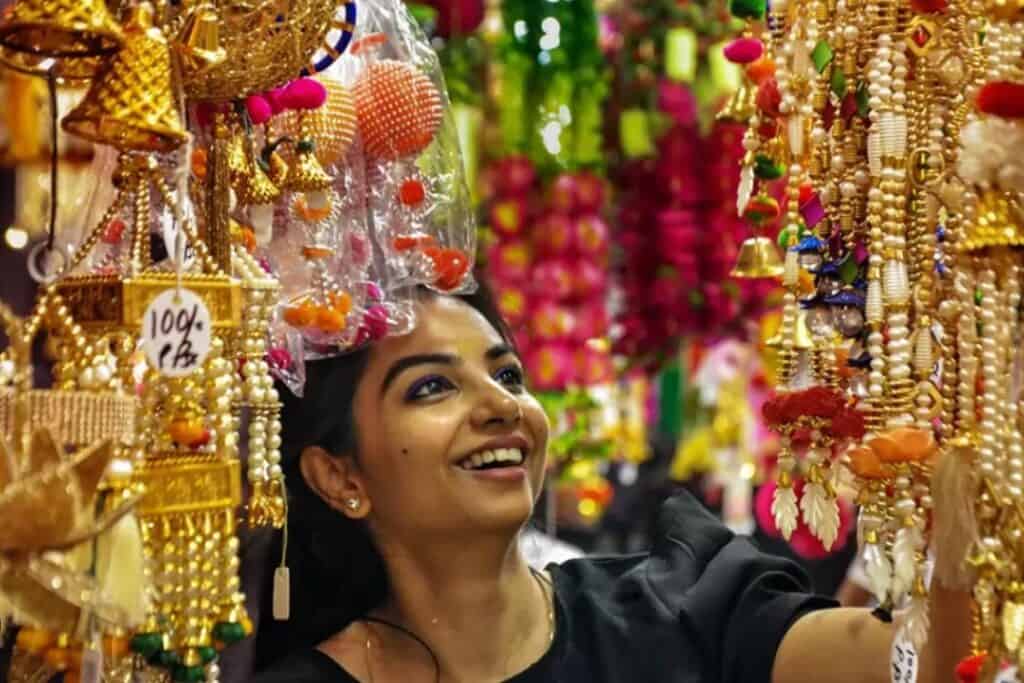
During the day try one of Delhi’s best markets like Dilli Haat INA, Khan Market or if you’re very adventurous, Chandni Chowk in Old Delhi. All of these markets will be open during the day and decorated for Diwali. Expect them to be buzzing with activing as locals do their last minute shopping.
2. Have Langar at Gurudwara Bangla Sahib
Having langar at Gurudwara Bangla Sahib is a wonderful community experience, and on this day the gurudwara prepares an extra special langar. Langar is the free community meal served at gurudwaras.
Diwali is on the same day Sikhs celebrate Bandi Chhor Diwas, the day the sixth Sikh guru, Guru Hargobind, was released from prison. It was on the main day of Diwali that Guru Hargobind reached Amritsar, the centre of Sikhism worldwide.
I recommend you visit Gurudwara Bangla Sahib, the most prominent gurudwara in Delhi. On Bandi Chhor Diwas it is beautifully lit up with festive lights and hundreds of lit candles. The gurudwara will be in a joyful mood as thousands of devotees celebrate this special day. You do not need to be Sikh to visit the gurudwara or have langar. Everyone is welcome, regardless of religion, nationality, sex or colour.
All visitors must cover their head and remove shoes to enter a gurudwara. There are bins with bandanas you can borrow on the gurudwara grounds. Gurudwara Bangla Sahib also has a designated visitors centre where tourists can leave shoes and borrow a bandana.
3. Visit the Dargah of the Sufi Saint Hazrat Nizamuddin
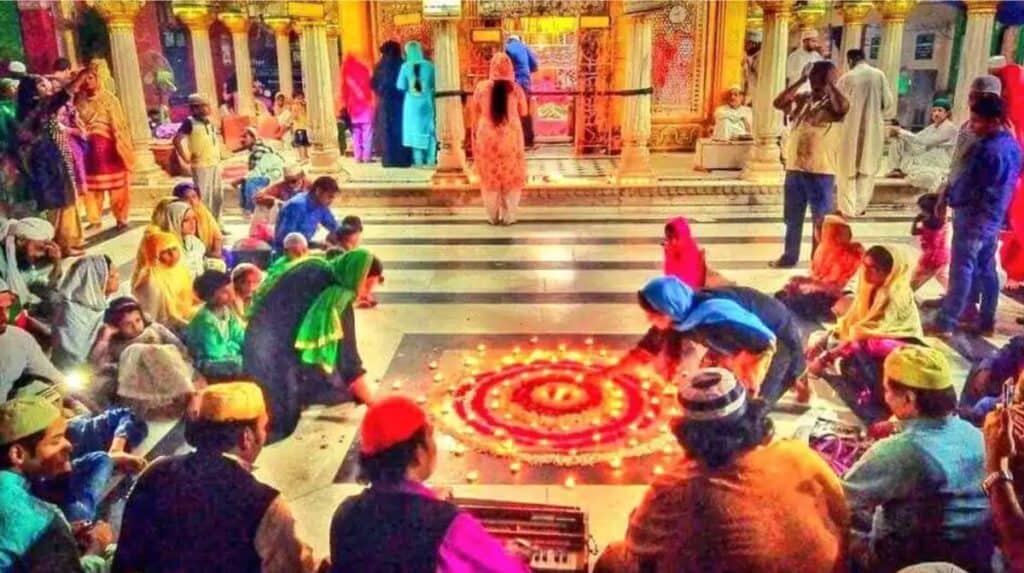
The shrine of the most powerful Sufi saint in Delhi might seem like an odd place to visit on Diwali, but the saint has many Hindu devotees in Delhi, and Muslims also celebrate Diwali. The dargah is the mausoleum of Khawja Nizamuddin Auliya, and is one of the most mystical and spiritual places in Delhi. Thousands of believers of all faiths visit each week.
On Diwali, Hindus come and light diyas and distribute sweets at the dargah. You will see rangolis in all corners and in front of the shrine itself. The dargah is already a beautiful, spiritual place, but with hundreds of lit diyas it takes on an otherworldly feel.
If you stay until after the evening prayers you can hear the famous qawwali singers. The same family has been singing qawwalis here for over 700 years. Trust me, it will be a magical evening you never forget.
Keep in mind this is a Muslim site which means you will have to remove your shoes, and women must cover their heads. There are little shops just outside the dargah entrance you can leave your shoes. I recommend dressing very modestly.
4. Hotel Diwali Parties and Dinners in Delhi
Many hotels in Delhi host Diwali themed events for their guests and visitors to the city. Pretty much all the five star hotels in Delhi put on an event for Diwali. Many home stays and family run bed and breakfasts also host something for their guests. You can check ahead with your accommodation to see what they are doing for Diwali.
5. Celebrate Diwali in Delhi with a Local Indian Family
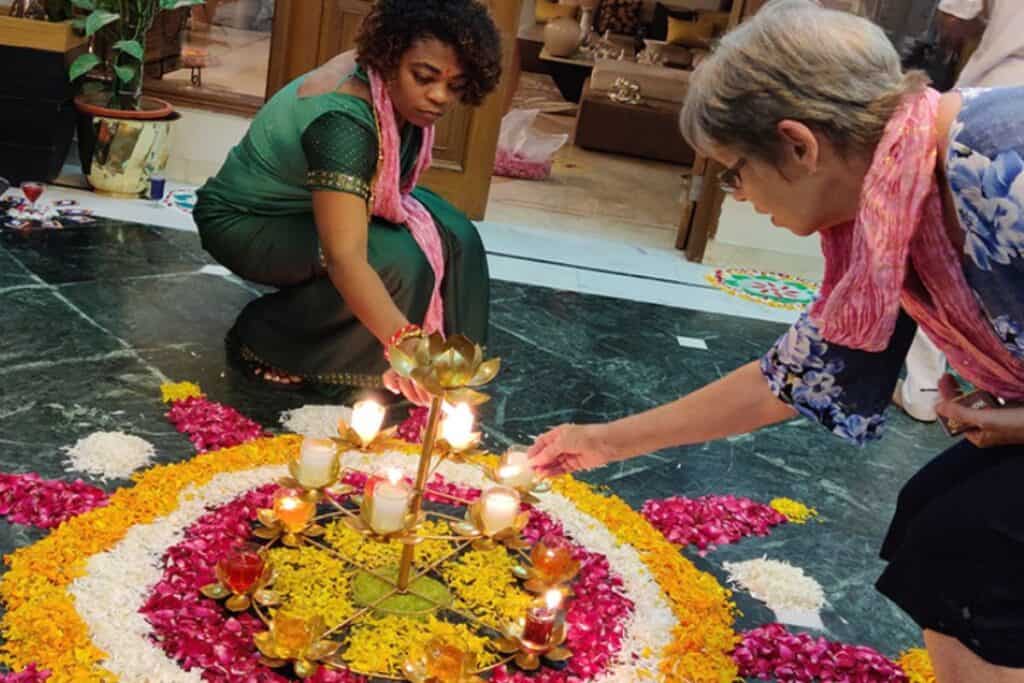
If you receive an invitation to spend Diwali with a local family, go! Wear the best clothes you have, or pick up something to wear (a nice two piece kurta suit would be appropriate) from a shop like Fab India, Meena Bazaar or one of the shops in Central Market Lajpat Nagar which sells great ethnic clothing at budget prices.
Buy a gift box of mithai (traditional Indian sweets) from one of the best sweet shops in Delhi, so you don’t arrive empty handed. It’s traditional to give sweets on Diwali.
You can still experience a traditional Diwali in Delhi even if you haven’t been invited by a local family. Tour companies like Viator and Get Your Guide both offer Diwali tours where you can experience the holiday with a local family
Where Can I Shop for Diwali in Delhi?
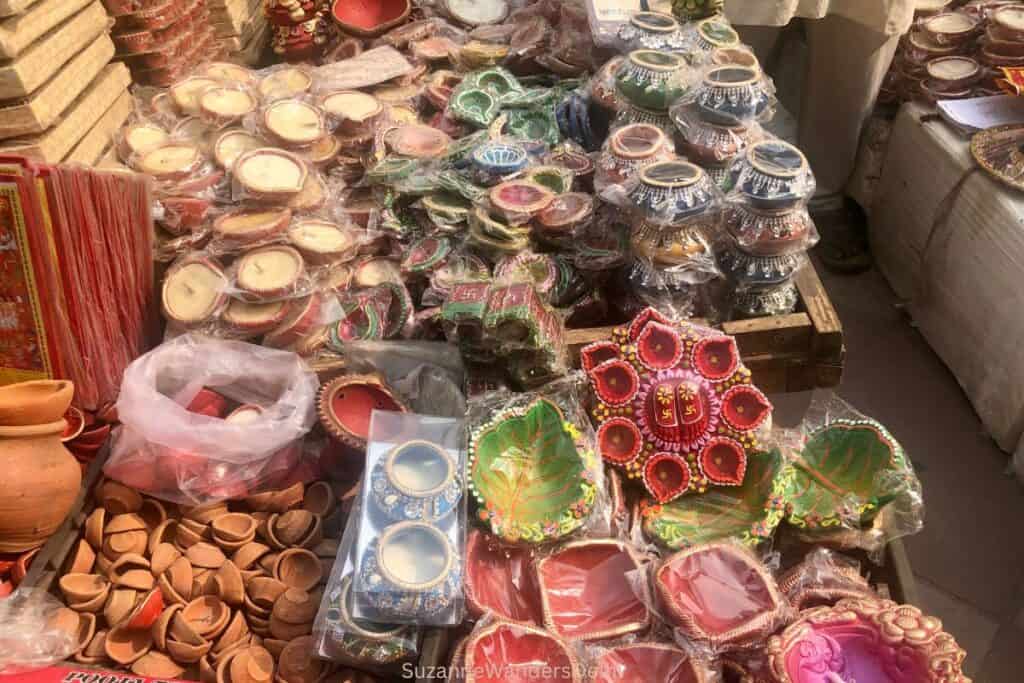
Shopping is big part of getting ready for Diwali. Delhiites shop for new clothes to wear on Diwali, gifts, and boxes of mithai (traditional Indian sweets). You’ll be able to find everything you need at Delhi’s markets, but the real fun is at the Diwali melas. These melas (fairs) spring up all over Delhi.
You can sample Diwali foods, shop for diyas, colourful lights and clothing, and have a very culturally authentic Diwali experience.
The 5 Best Diwali Melas in Delhi
These are the best of the neighbourhood Diwali melas in Delhi. Each one is unique and has its own special charm. The melas usually run for several days leading up to Diwali. Dates change each year so check ahead.
1. Blind School Diwali Mela
This is one of the best and most famous Diwali melas in Delhi. Many of the stalls are hosted by NGOs. You can pick up all kinds of great gifts like homemade chocolates, cookies, clothing, home decor items, handmade lamps and artwork.
This mela started over 40 years ago but had to take a long hiatus during the pandemic. Fortunately this very popular mela is back with a bang and over 150 stalls. Check for timings and dates on their FB page: Blind School Diwali Mela.
- Location: The Blind Relief Association, Lala Lajpat Rai Road (Lal Bahadur Shastri Marg), near the Oberoi Hotel, New Delhi
- Hours and entrance fee: 10:30 am – 8:00 pm; free
2. Dilli Haat INA Mela
Dilli Haat is one of the most popular markets in Delhi for locals and visitors, but make sure you go to the INA location. It’s the best by far.
You’ll find all the traditional Diwali items here, including beautiful hand painted diyas (these make great gifts for people back home – you can use them as candleholders). There’s an ever changing roster of Indian artisans and a fabulous outdoor food court with stands offering food from states all across India.
- Location: Dilli Haat INA, Kidwai Nagar West, Kidwai Nagar, New Delhi
- Hours and entrance fee: 10:30 am – 10:00 pm; INR 100
3. Sunder Nagar Diwali Mela
Sunder Nagar Diwali Mela is one of the most famous melas in Delhi. This one is more like a fair with games, amusement park rides, food stalls and plenty of shopping. Not all stalls accept credit cards or electronic payments so make sure you bring some cash. This is not a sedate, quiet mela – it’s a crowded, but fun festival geared for the whole family.
It’s located in a historic area of East Delhi, near Sunder Nursery and Humayun’s Tomb.
- Location: Sunder Nagar Park, Sundar Nagar, Delhi
- Hours and entrance fee: 4:00 pm – 11:00 pm; INR 100, children under 5 free
4. Gumbad Defence Colony Diwali Mela
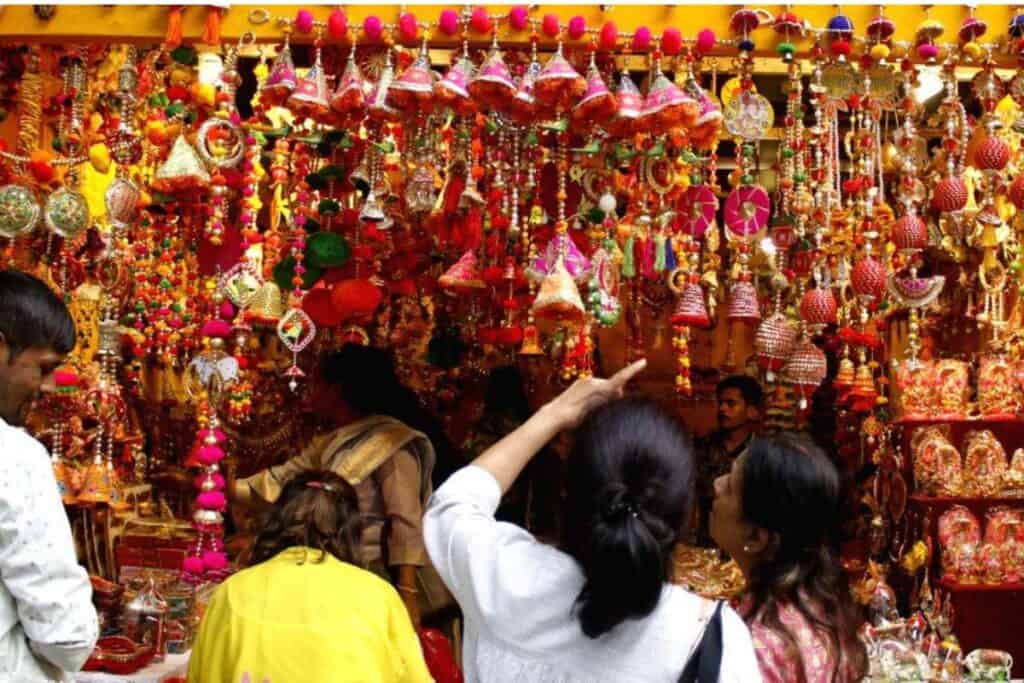
The Defence Colony mela is one of the best neighbourhood Diwali melas in Delhi. You’ll be able to shop for all kinds of lovely diyas, decorative lights and stock up on rangoli colours. There’s always lots of food options, games and cultural performances at this two day festival.
Defence Colony is a more affluent, centrally located neighbourhood in Delhi. The mela is a great one for visitors because it’s relatively calm and easy to get to.
- Location: at the Gumbad Roundabout, Defence Colony, New Delhi
- Hours and entrance fee: 2:00 pm – 10:00 pm; INR 100
5. Dastkar Festival of Lights Mela
Dastkar Nature Bazaar is Delhi’s most authentic cultural market and a wonderful alternative to the more commercial Dilli Haat INA. Every year they host a Diwali mela with over 180 artisans from across India showcasing beautiful handicrafts. There are no rides and crazy games here, this is where locals come for authentic Indian products.
The bazaar is a joint initiative between NGO Dastkar and Delhi Tourism which provides a place for artisans from around India to showcase and sell their handicrafts. Check for timings and dates on their website: Dastkar Nature Bazaar.
- Location: Dastkar Nature Bazaar, Andheria Modh, Anuvrat Marg, New Delhi
- Hours and entrance fee: 11:00 am – 7:00 pm; INR 40
When is Diwali in Delhi?
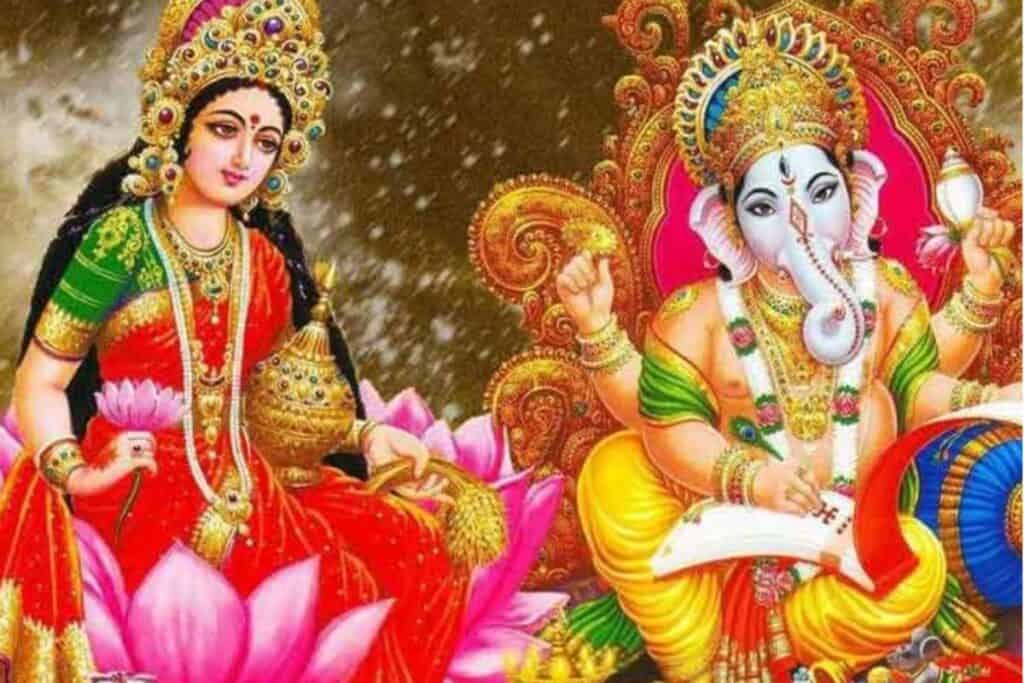
Diwali is a five day festival that usually falls between October and November each year. It is based on the Hindu lunar calendar so dates change each year. In 2024, it is Tuesday, October 29th to Sunday, November 3rd.
The third day of Diwali is the most important and the one that is the official government holiday. In 2024 it is Thursday, October 31st. This day is known as Lakshmi Puja. It is this day the religious rites (puja) are performed for Goddess Lakshmi, and people leave their front doors open to invite the Goddess in.
- 2025: Saturday, October 18th to Thursday, October 23rd. The most important day and government holiday is Monday, October 20th.
- 2026: Thursday, November 5th to Tuesday, November 10th. The most important day and government holiday is Sunday, November 8th.
How is Diwali Celebrated in Delhi?
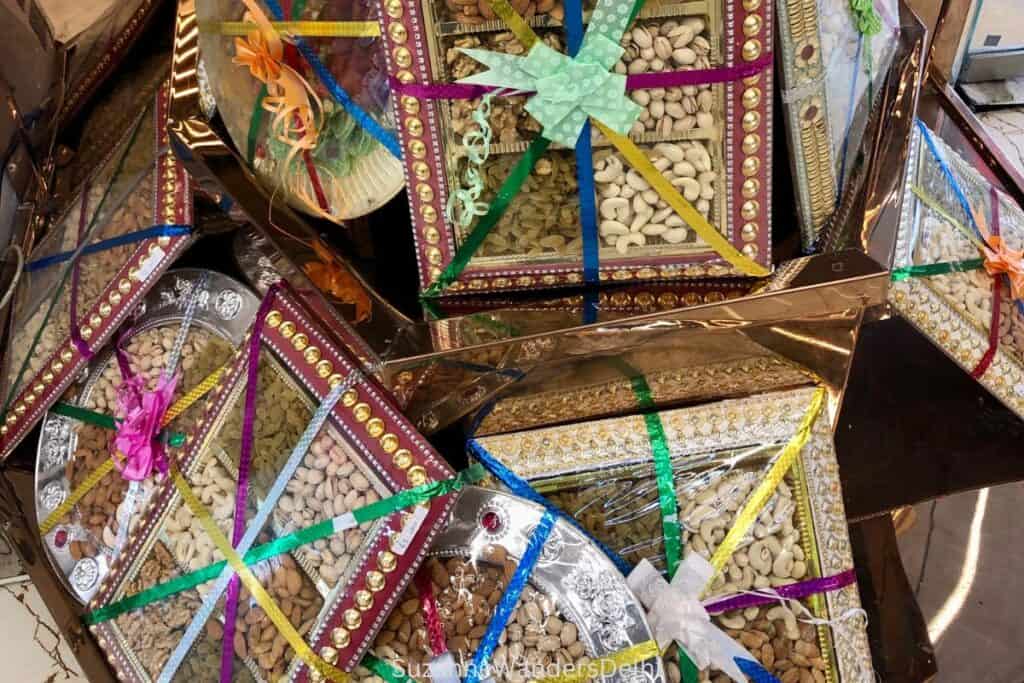
Diwali is a joyful, family holiday. It’s basically the Christmas of India. Delhiites celebrate Diwali by:
- visiting relatives and spending time with family and close friends
- exchanging gifts
- performing pujas
- watching fireworks displays (though the Delhi government bans fireworks every year due to pollution levels, this is widely ignored and you’ll hear firecrackers almost every night leading up to and during Diwali)
- lighting diyas and small lamps
- stringing festive lights on the exterior of homes and businesses
- eating Indian sweets
- decorating homes and entranceways with rangoli
What Special Foods are Prepared for Diwali in Delhi?
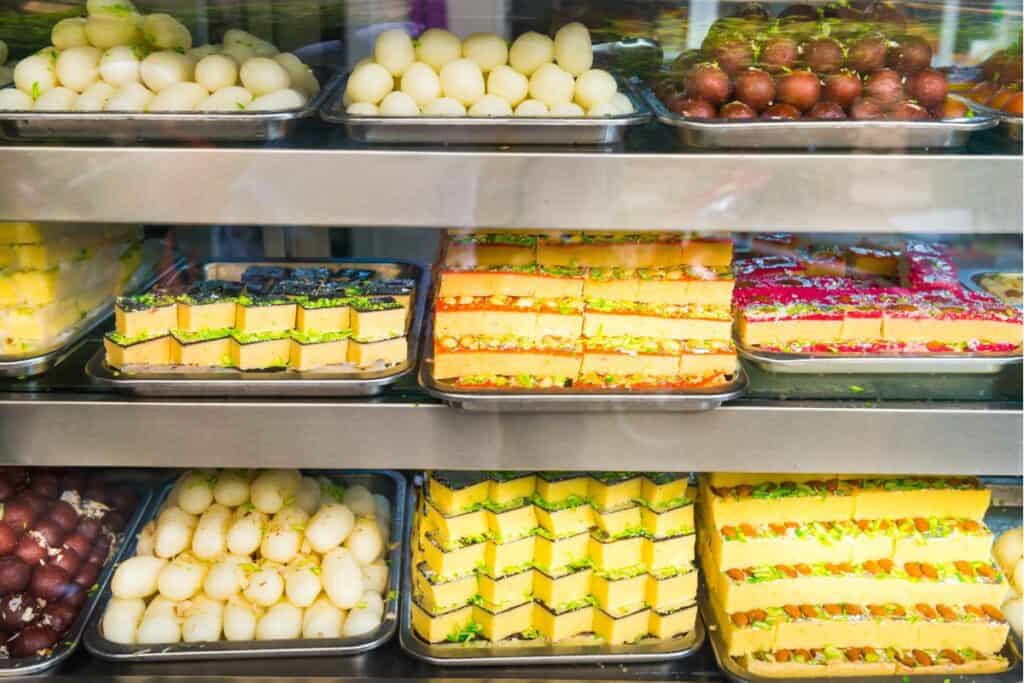
Like any big, festive holiday, foods will vary from home to home, but Indian sweets (mithai) and savoury snacks are very popular. It is traditional to exchange and eat mithai during Diwali. I had the wonderful foresight to visit my dentist a week before Diwali and she gave me a beautiful box of handmade chocolates!
Indian mithai are very rich and sweet, usually made with condensed milk, ghee and lots of sugar or jaggery. They often contain dried fruits and nuts. Every Delhiite has their favourite sweet shop, but some great ones are Evergreen Sweet House, Haldiram’s and Bengali Sweet Centre.
As well as mithai, savory snacks are also very popular, like pakoras, samosas, idli and puris. You’ll find a lot of these for sale at the Diwali melas and stands set up in the markets. Don’t miss out on trying the street food of Delhi. Street food is an integral part of Delhi culture, and some of the best food in the city is at its roadside stalls.
What are the Five Days of Diwali?
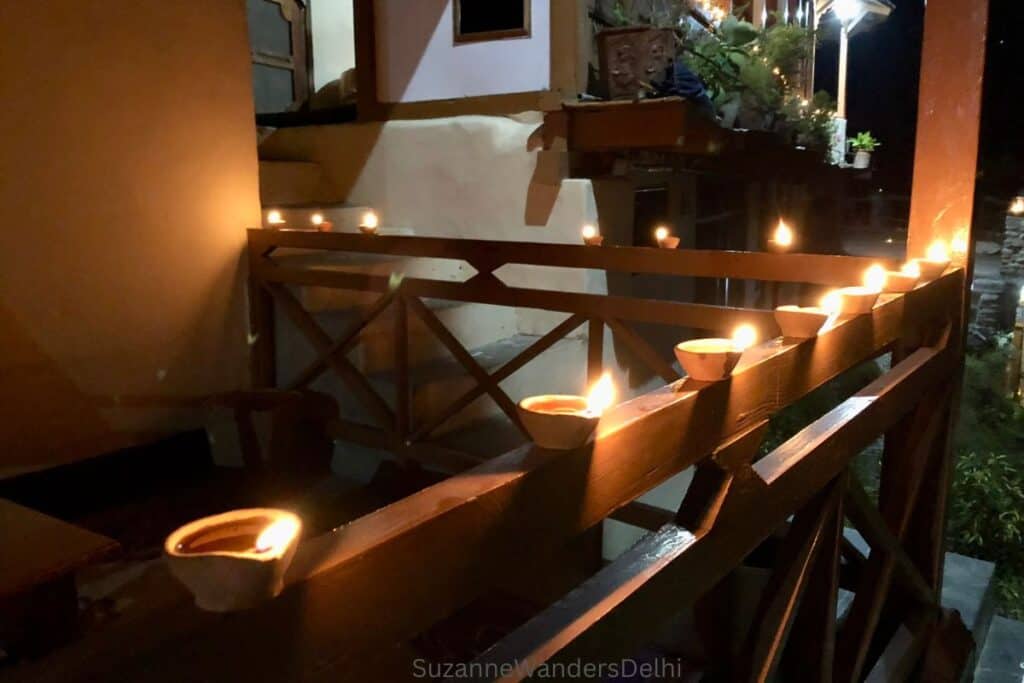
Diwali is a five day festival. The main day and the government holiday are the third day. The five days are:
- Day 1: Dhanteras – On the first day of Diwali it is traditional to clean the home and purchase small items of gold and kitchen utensils. 13 diyas are lit and placed at specific areas around the home to ward off evil and invite blessings.
- Day 2: Narak Chaturdashi – This day is also called Choti Diwali which means little Diwali. This is the day people decorate the floors and exterior entrances with rangoli (patterns made with coloured chalk, rose petals or rice). It is auspicious to light 14 diyas and place them at specific locations throughout the home.
- Day 3: Lakshmi Puja – This is the main day of Diwali. Today families gather together for a special puja dedicated to the Goddess Lakshmi. This is followed by a large meal, fireworks and general festivities. People light diyas and place them around the exterior of their homes. Gifts are exchanged on this day.
- Day 4: Govardhan Puja – Lord Krishna is worshipped on this day. Devotees perform puja and build a small hill of food (or cow dung, which is more traditional) to represent the hill Govardhan that Lord Krishna lifted to save the people of Mathura from a torrential rain.
- Day 5: Bhaiya Dooj – On the last day of Diwali, sisters pray and perform a puja for their brothers. In response, brothers gift their sisters with things like sweets, cake and flowers.
The Legend Behind Diwali
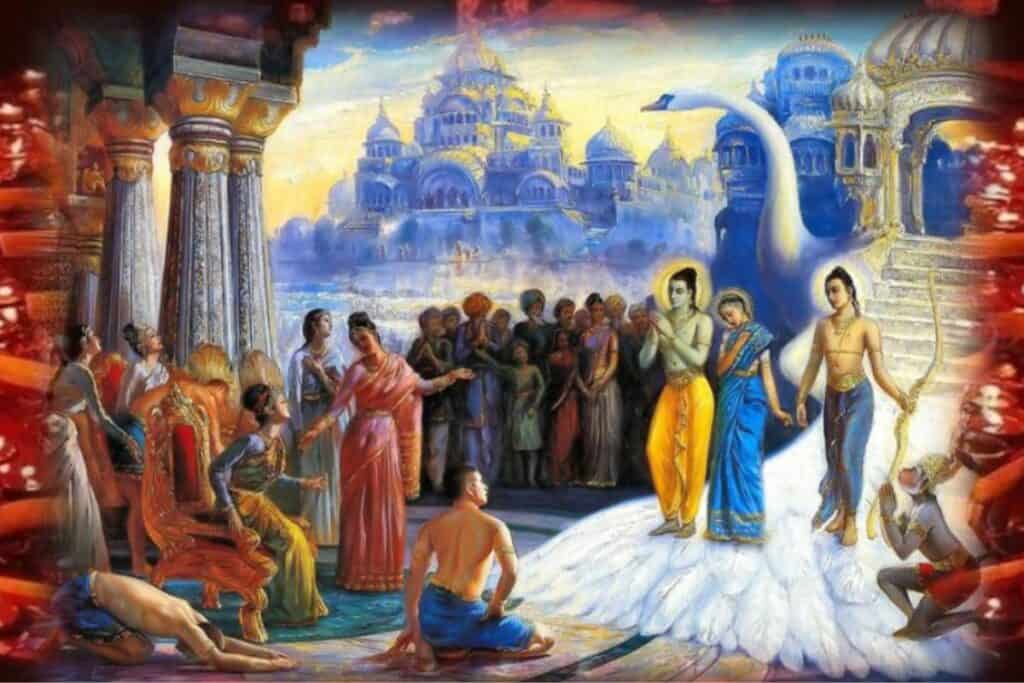
Hindus observe Diwali to celebrate the return of Lord Rama, his wife Sita and brother Lakshman to Ayodhya after 14 years of exile. This is the main theme of the Indian epic the Ramayana which much of Hindu belief is based on. Lord Rama is one of the most important Hindu gods and the seventh avatar of Vishnu, who is considered the supreme god.
After defeating the demon king Ravana (the main theme in the Ramayana), Lord Rama returns to Ayodhya. To welcome him and light his way home, the people of Ayodhya illuminated their homes by lighting small oil lamps called diyas. Even today, the lighting of diyas is an important tradition of Diwali.
The Worship of Lakshmi and Ganesha on Diwali
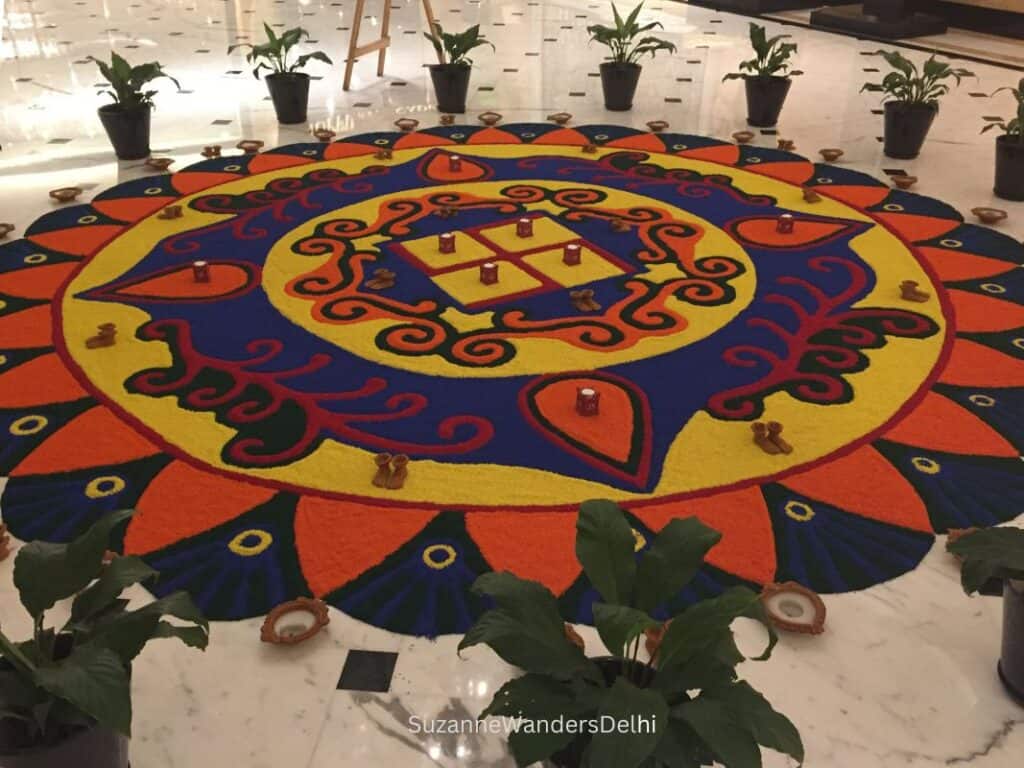
The Goddess Lakshmi is widely revered during Diwali. On the night of Diwali it is believed she visits the homes of each and every one of her followers, bestowing prosperity and good fortune. In fact, many people leave their front doors open at night during the puja (the religious offerings) to invite her in.
To welcome the Goddess, rangoli are created outside home entrances during Diwali. Rangoli are designs made from coloured chalk, rice or flower petals. They are usually bordered with a lotus motif. Some of these designs are very intricate and colourful. Most Delhi hotels will have large rangoli in their lobbies on Diwali.
Lakshmi and Ganesha are often depicted together during Diwali. Ganesha is considered the remover of obstacles and the god of wisdom. The main theory of why Ganesha is worshiped with Lakshmi during Diwali is that without wisdom, prosperity will not come.
What is the Difference Between Diwali and Deepavali?
Diwali and Deepavali are the same festival. Etymologically, Deepavali is a Sanskrit word which means row of lamps. Diwali is a corrupted form of Deepavali used in northern India. South India and east India use the word Deepavali while north India (including Delhi) refers to the holiday as Diwali.
What is Closed in Delhi on Diwali?
The third day of Diwali is a government holiday. Schools, government offices, banks and liquor stores are closed. Schools and banks remain closed for several days. ATMs are open but may not get restocked – I highly recommend you get your cash out in advance of Diwali. I have seen many ATMs run out of cash during holidays in Delhi.
Delhi monuments and attractions are open on Diwali. Restaurants and markets are also open on this day, though markets will close earlier. I would avoid the markets on Diwali unless you go in the morning, they will be super crowded.
Is the Delhi Metro closed on Diwali?
No, the Delhi metro is open on Diwali and runs on a moderately regular schedule – the last train departs one hour earlier than usual from terminus stations, at 10:00 pm. You can check their website for the latest Diwali updates: Delhi Metro Rail Corporation.
Is Pollution Bad in Delhi During Diwali?
Yes, air pollution is very bad at this time of year. Farmers in Punjab burn their fields, and that combined with the nightly firecrackers and typical lack of rain during this time of year can send pollution levels into the 400s.
If you suffer from bronchial problems it is best to avoid Delhi during Diwali. At the very least I recommend requesting an air purifier for your room, and consider wearing a mask when you go out.
The Wrap-Up on Diwali in Delhi: How to Celebrate the Festival of Lights
Diwali is a very special time to be in Delhi. Even if you are a visitor there are many ways you can enjoy and celebrate the most important Hindu holiday of the year. Delhi is festive and joyful during Diwali. It’s a wonderful way to experience authentic Indian culture.
Looking for more? You make also like…
- Delhi in Winter: An Insider’s Guide
- 14 of the Best Hot Chocolates in Delhi to Warm Up With
- Taj Mahal Sunrise Tour from Delhi: Three Great Options
Don’t forget travel insurance! It’s always a good idea to carry travel insurance just in case something goes wrong. I really like and use SafetyWing



